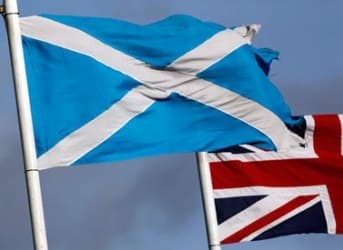Sobering figures about Scotland’s economy are emerging as the country prepares for its upcoming referendum on independence, scheduled for 18 September 2014.
Briefly put, the British and Scottish governments spent over £65 billion north of the Border in 2012-13, but taxes raised just £53 billion. Scotland’s deficit – the difference between spending and taxes raised north of the Border– spiraled to 8.3 per cent of GDP in 2012/13, according to figures from the Government Expenditure and Revenue Scotland (GERS) released by Scotland’s First Minister and Scottish National Party leader Alex Salmond. GERS noted that oil revenues dropped by more than two-fifths in 2012/13, pushing Scotland's deficit above the UK's for the first time in recent years.
Related Article: It’s Scotland’s Oil – and it Will Need a Lot of Investment
The amount of tax generated by Scotland’s North Sea fields plummeted from £10 billion in 2011-12 to just £5.6 billion, a 41.5 per cent fall. Salmond attributed the revenue decline to an unplanned stoppage in the Elgin oil field and the oil industry's shift from revenue-gathering towards investment, commenting that the Elgin shutdown was a "one-off event" and that he did not expect unplanned stoppages every year. Salmond stated that the SNP planned for two oil funds, one to stabilize Scotland's heavily oil dependent economy and another to save for the future, which would shore up Scotland's budget against future oil shocks like the one seen in 2012/13.
Despite the attempts to put a positive spin on the figures, the growing fiscal “black hole” has destroyed SNP claims that Scotland pays more towards the UK than it receives back and exposes the risks of building an economy on such a volatile resource as oil.
Other SNP policies clearly unsettle Westminster, as Salmond and his senior lieutenants have repeatedly said that an independent Scotland would walk away from its £150 billion share of the United Kingdom's debt if it were denied sharing the pound.
Lib Dem Chief Secretary to the Treasury Danny Alexander said the SNP's warning to default on Scotland's share of the bill would cost Scottish households £100 a week. Alexander commented, “Whatever the Scottish Government says now, the government of an independent Scotland would be forced to raise taxes and cut public services. We are better off together.”
Related Article: Hydropower increasingly important in Scotland
Former Chancellor Alistair Darling, who is leading the pro-Union Better Together campaign, chimed in, “This is a landmark moment in the debate. This is the day that Alex Salmond’s own figures made the case against independence. If Scotland was independent today we would have no option but to cut spending on services like schools and hospitals or put up taxes – or probably both. Today as part of the UK we don’t have to do that. Oil revenues are a major source of Scotland’s income, but are a relatively small part of the UK economy. The drop in oil revenue is so big that it is the equivalent of the entire budget for Scottish schools.”
Economist John McLaren at Glasgow University’s Center for Public Policy for Regions said, “Measuring Scotland’s fiscal position relative to the UK depends heavily on North Sea oil revenues. Recent years have, on average, shown the fiscal balance relative to the UK to be marginally in Scotland’s favour but, in 2012-13 the reverse is now true. This is likely to remain the case in 2013-14, as North Sea revenues are projected to fall again.”
Another element inducing caution is a private dossier, written last October for SNP ministers, which warned that independence could trigger higher taxes or deeper spending cuts, noting that Scotland ran a deficit for 20 of the last 21 years.
The next six months will see the sharpening of such economic scenarios, with the pro-Union advocates painting the darkest possible independence picture even as the SNP releases optimistic and upbeat studies. All the Scottish voters can do is read the fine print, and hope that there are no more North Sea “unplanned stoppages.”
By John Daly of Oilprice.com


















